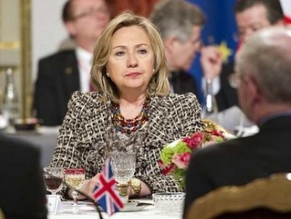|
World Jewish News

U.S. Secretary of State Hillary Clinton at a summit at the Elysee Palace in Paris on March 19, 2011. Photo by: AFP
|
U.S., EU welcome Iran nuclear letter, suggest talks possible
17.02.2012, Israel and the World The United States and European Union expressed cautious optimism on Friday over prospects that Iran may be willing to engage major powers in new talks, but underscored any new negotiations must be sustained and focus on the nuclear issue.
Secretary of State Hillary Clinton and European Union foreign policy chief Catherine Ashton, told reporters that Iran's recent letter to Ashton might mark a step forward.
"We think this is an important step and we welcome the letter," Clinton said in a joint meeting with Ashton. She stressed that the major powers were still reviewing their formal response to Tehran's offer.
Ashton, who handles contact with Iran on behalf of the "P5+1" group comprised of the United States, Britain, France, Russia, China and Germany, said the letter showed "a potential possibility that Iran may be ready to start talks."
Iran's letter to Ashton, which was obtained by Reuters on Thursday, proposed resuming the stalled talks and said Tehran would have "new initiatives" to bring to the table.
But the brief letter offered no specific proposals, leaving a question mark over Tehran's willingness to enter substantive negotiations on its nuclear work.
Clinton, however, said the Iranian letter "appeared to acknowledge and accept" and the western countries' longstanding condition that any talks begin with a discussion of its nuclear program.
"We must be assured that, if we make a decision to go forward, we see a sustained effort by Iran to come to the table, to work until we have reached an outcome that has Iran coming back into compliance with their international obligations," Clinton said.
Tension has been rising between Iran and the western countries over its nuclear ambitions, which have led the UN Security Council to impose several rounds of economic sanctions on Tehran which have been further strengthened by unilateral European and U.S. sanctions.
Haaretz.com
|
|
